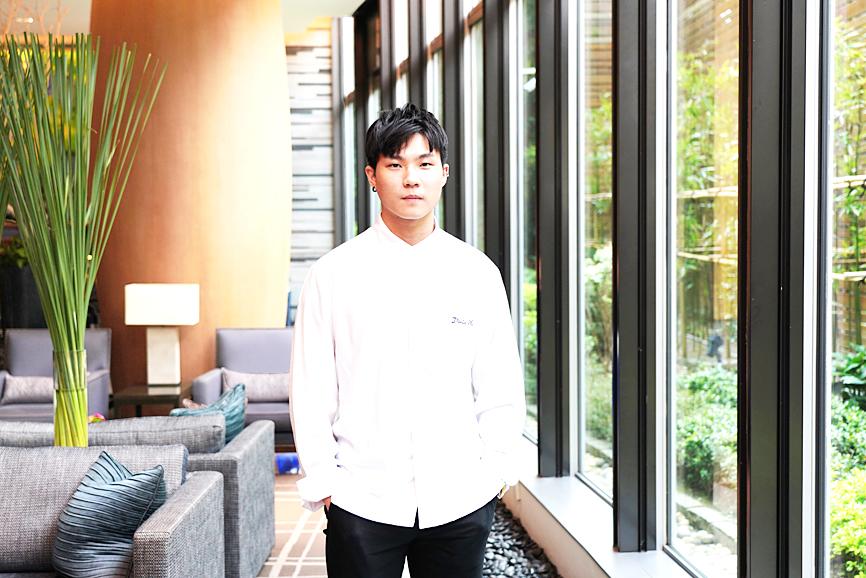Chailease Holding Co (中租控股), the nation’s top leasing services provider, yesterday unveiled plans to open a fine-dining restaurant featuring French cuisine by the end of this year, with an eye to winning Michelin recognition.
The release of the latest edition of the Michelin Guide on Wednesday prompted Chailese Group chairman Andre Koo (辜仲立) to take action and tap further into the food and beverage market, the company said in a statement.
Chailese Group, which owns Chailise Holdings, Grand Pacific Investment & Development Holding Co (中時控股), Chailease International Finance Co (仲利國際) and the Park City Hotel chain (成旅晶贊), set up a food company, Les Terroirs de Chailese Co (艾斯奇餐飲), in 2018 to sell imported wine, beef noodles and instant coffee.

Photo courtesy of Chailease Holding Co
The upcoming restaurant would target the high-end market by offering French dishes fused with Taiwanese cultural elements, Les Terroirs de Chailese chairman John Huang (黃炳彰) said.
The company recruited young Taiwanese chef Darius Wu (吳定祐) to take charge of the restaurant’s kitchen and design the menu, it said.
Wu, 26, who graduated from National Kaohsiung University of Hospitality and Tourism (國立高雄餐旅大學), has won cooking awards in Taiwan and abroad, and has worked at popular French restaurants in Taipei Atelier de Patrick (法式派翠克餐廳), Orchid (蘭法式餐廳) and De Nuit (法式餐廳).
Wu said he would take advantage of the opportunity to invest in himself and sharpen his cooking skills.

Taiwan Semiconductor Manufacturing Co (TSMC, 台積電) last week recorded an increase in the number of shareholders to the highest in almost eight months, despite its share price falling 3.38 percent from the previous week, Taiwan Stock Exchange data released on Saturday showed. As of Friday, TSMC had 1.88 million shareholders, the most since the week of April 25 and an increase of 31,870 from the previous week, the data showed. The number of shareholders jumped despite a drop of NT$50 (US$1.59), or 3.38 percent, in TSMC’s share price from a week earlier to NT$1,430, as investors took profits from their earlier gains

In a high-security Shenzhen laboratory, Chinese scientists have built what Washington has spent years trying to prevent: a prototype of a machine capable of producing the cutting-edge semiconductor chips that power artificial intelligence (AI), smartphones and weapons central to Western military dominance, Reuters has learned. Completed early this year and undergoing testing, the prototype fills nearly an entire factory floor. It was built by a team of former engineers from Dutch semiconductor giant ASML who reverse-engineered the company’s extreme ultraviolet lithography (EUV) machines, according to two people with knowledge of the project. EUV machines sit at the heart of a technological Cold

AI TALENT: No financial details were released about the deal, in which top Groq executives, including its CEO, would join Nvidia to help advance the technology Nvidia Corp has agreed to a licensing deal with artificial intelligence (AI) start-up Groq, furthering its investments in companies connected to the AI boom and gaining the right to add a new type of technology to its products. The world’s largest publicly traded company has paid for the right to use Groq’s technology and is to integrate its chip design into future products. Some of the start-up’s executives are leaving to join Nvidia to help with that effort, the companies said. Groq would continue as an independent company with a new chief executive, it said on Wednesday in a post on its Web

CHINA RIVAL: The chips are positioned to compete with Nvidia’s Hopper and Blackwell products and would enable clusters connecting more than 100,000 chips Moore Threads Technology Co (摩爾線程) introduced a new generation of chips aimed at reducing artificial intelligence (AI) developers’ dependence on Nvidia Corp’s hardware, just weeks after pulling off one of the most successful Chinese initial public offerings (IPOs) in years. “These products will significantly enhance world-class computing speed and capabilities that all developers aspire to,” Moore Threads CEO Zhang Jianzhong (張建中), a former Nvidia executive, said on Saturday at a company event in Beijing. “We hope they can meet the needs of more developers in China so that you no longer need to wait for advanced foreign products.” Chinese chipmakers are in